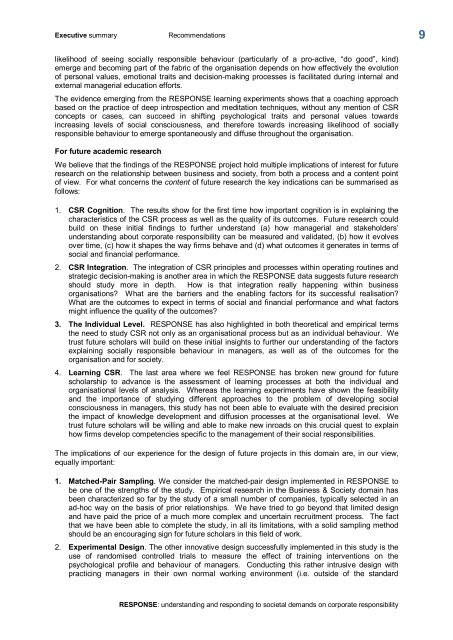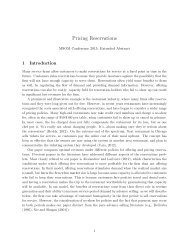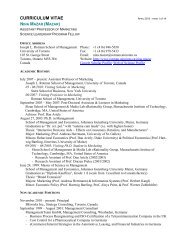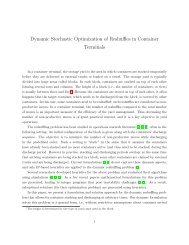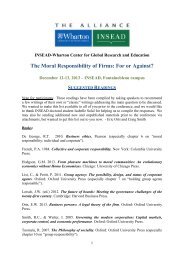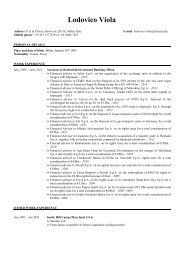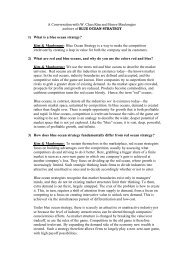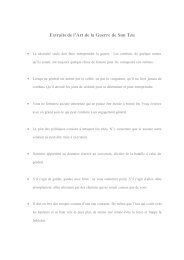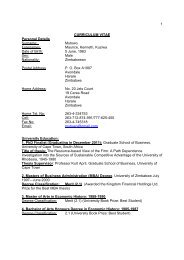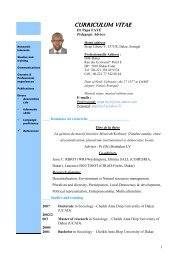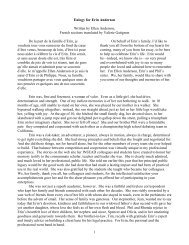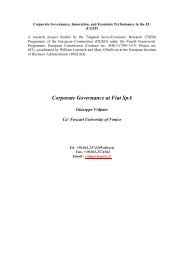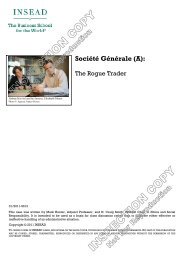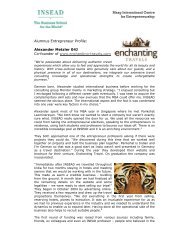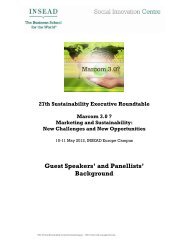RESPONSE - Insead
RESPONSE - Insead
RESPONSE - Insead
Create successful ePaper yourself
Turn your PDF publications into a flip-book with our unique Google optimized e-Paper software.
Executive summary Recommendations<br />
likelihood of seeing socially responsible behaviour (particularly of a proactive, “do good”, kind)<br />
emerge and becoming part of the fabric of the organisation depends on how effectively the evolution<br />
of personal values, emotional traits and decisionmaking processes is facilitated during internal and<br />
external managerial education efforts.<br />
The evidence emerging from the <strong>RESPONSE</strong> learning experiments shows that a coaching approach<br />
based on the practice of deep introspection and meditation techniques, without any mention of CSR<br />
concepts or cases, can succeed in shifting psychological traits and personal values towards<br />
increasing levels of social consciousness, and therefore towards increasing likelihood of socially<br />
responsible behaviour to emerge spontaneously and diffuse throughout the organisation.<br />
For future academic research<br />
We believe that the findings of the <strong>RESPONSE</strong> project hold multiple implications of interest for future<br />
research on the relationship between business and society, from both a process and a content point<br />
of view. For what concerns the content of future research the key indications can be summarised as<br />
follows:<br />
1. CSR Cognition. The results show for the first time how important cognition is in explaining the<br />
characteristics of the CSR process as well as the quality of its outcomes. Future research could<br />
build on these initial findings to further understand (a) how managerial and stakeholders’<br />
understanding about corporate responsibility can be measured and validated, (b) how it evolves<br />
over time, (c) how it shapes the way firms behave and (d) what outcomes it generates in terms of<br />
social and financial performance.<br />
2. CSR Integration. The integration of CSR principles and processes within operating routines and<br />
strategic decisionmaking is another area in which the <strong>RESPONSE</strong> data suggests future research<br />
should study more in depth. How is that integration really happening within business<br />
organisations? What are the barriers and the enabling factors for its successful realisation?<br />
What are the outcomes to expect in terms of social and financial performance and what factors<br />
might influence the quality of the outcomes?<br />
3. The Individual Level. <strong>RESPONSE</strong> has also highlighted in both theoretical and empirical terms<br />
the need to study CSR not only as an organisational process but as an individual behaviour. We<br />
trust future scholars will build on these initial insights to further our understanding of the factors<br />
explaining socially responsible behaviour in managers, as well as of the outcomes for the<br />
organisation and for society.<br />
4. Learning CSR. The last area where we feel <strong>RESPONSE</strong> has broken new ground for future<br />
scholarship to advance is the assessment of learning processes at both the individual and<br />
organisational levels of analysis. Whereas the learning experiments have shown the feasibility<br />
and the importance of studying different approaches to the problem of developing social<br />
consciousness in managers, this study has not been able to evaluate with the desired precision<br />
the impact of knowledge development and diffusion processes at the organisational level. We<br />
trust future scholars will be willing and able to make new inroads on this crucial quest to explain<br />
how firms develop competencies specific to the management of their social responsibilities.<br />
The implications of our experience for the design of future projects in this domain are, in our view,<br />
equally important:<br />
1. MatchedPair Sampling. We consider the matchedpair design implemented in <strong>RESPONSE</strong> to<br />
be one of the strengths of the study. Empirical research in the Business & Society domain has<br />
been characterized so far by the study of a small number of companies, typically selected in an<br />
adhoc way on the basis of prior relationships. We have tried to go beyond that limited design<br />
and have paid the price of a much more complex and uncertain recruitment process. The fact<br />
that we have been able to complete the study, in all its limitations, with a solid sampling method<br />
should be an encouraging sign for future scholars in this field of work.<br />
2. Experimental Design. The other innovative design successfully implemented in this study is the<br />
use of randomised controlled trials to measure the effect of training interventions on the<br />
psychological profile and behaviour of managers. Conducting this rather intrusive design with<br />
practicing managers in their own normal working environment (i.e. outside of the standard<br />
<strong>RESPONSE</strong>: understanding and responding to societal demands on corporate responsibility<br />
9


